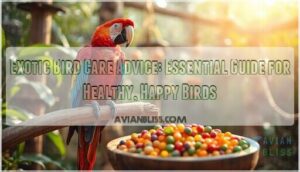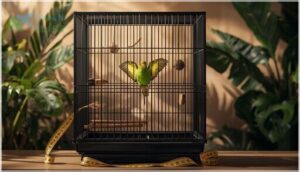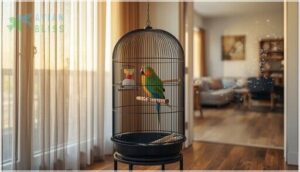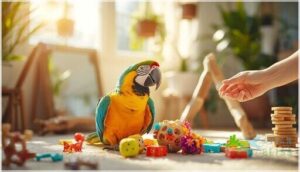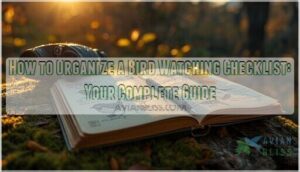This site is supported by our readers. We may earn a commission, at no cost to you, if you purchase through links.
A macaw can live for 80 years, which means choosing an exotic bird isn’t just selecting a pet—it’s welcoming a lifelong companion who’ll need your commitment for decades. Many first-time bird owners underestimate what these intelligent creatures require, leading to stress for both the bird and the family.
Exotic birds don’t thrive on seed mixes alone, they can’t tolerate Teflon fumes from your cookware, and a cramped cage can trigger self-destructive behaviors that are heartbreaking to witness.
Getting exotic bird care advice before you bring home a feathered friend makes the difference between a vibrant, vocal companion and a stressed animal with plucking behaviors. The good news is that with proper knowledge about nutrition, housing, socialization, and health maintenance, you can create an environment where your bird flourishes and forms a deep bond with your family.
Table Of Contents
- Key Takeaways
- Choosing The Right Exotic Bird
- Creating an Optimal Bird Environment
- Providing a Balanced and Healthy Diet
- Maintaining Health and Hygiene
- Supporting Socialization and Mental Wellness
- Frequently Asked Questions (FAQs)
- Do you know about avian husbandry?
- Do birds need a bath?
- Should you let a bird out of a cage?
- Can birds be trained for obedience?
- How do I choose a good bird cage?
- Do birds use perches?
- How to care for an exotic bird?
- What to do if you find an exotic bird?
- What is the hardest bird to take care of?
- How long do exotic birds live?
- Conclusion
Key Takeaways
- Exotic birds require a decades-long commitment with proper species research before acquisition, since macaws live up to 80 years and compatibility mismatches drive most rehoming cases due to noise levels and demanding social needs.
- Creating an optimal environment means selecting cages that allow full wing extension with species-appropriate bar spacing, placing them away from kitchens where nonstick cookware fumes can kill birds within minutes, and providing 10-12 hours of daily light with UVB exposure for vitamin D synthesis.
- A balanced diet consists of 50-70% commercial pellets to prevent nutritional deficiencies, supplemented with fresh vegetables and limited fruits, while strictly avoiding toxic foods like chocolate, avocado, and caffeine that cause rapid organ failure.
- Mental wellness depends on 1-2 hours of daily social interaction, weekly toy rotation to prevent stereotypic behaviors like feather plucking that affect over 25% of pet parrots, and biannual veterinary check-ups since birds instinctively hide illness until conditions become critical.
Choosing The Right Exotic Bird
Selecting the right exotic bird isn’t a decision you should rush into, because each species brings its own personality, care demands, and years of companionship. Your lifestyle, experience level, and home environment will all play a role in determining which bird becomes your ideal match.
Before you settle on a particular species, you’ll want to think about three essential factors that can make or break your relationship with your feathered friend.
Researching Bird Species and Lifespan
How long will your feathered friend share your life? This question matters more than you might think. Exotic birds range dramatically in lifespan—budgerigars usually live 5 to 12 years, while African grey parrots and cockatoos can reach 40 to 70 years or more.
Larger species often outlive smaller ones, making owner succession planning essential for lifelong companionship with these notable animals. Proper nutrition is key, as it greatly impacts how long parrots live.
Assessing Temperament and Compatibility
Beyond lifespan, temperament testing reveals which birds truly suit your household. Research shows that fearfulness, activity, and vigilance shape how parrots respond to handling and noise. Incompatibility drives rehoming risks—screaming and biting top the list of behavior problems reported by shelters.
Social needs vary widely; some species demand 30+ minutes of daily interaction, while others tolerate independence. Assess noise levels honestly: even small parrotlets reach 82 dB during peak vocalizations, rivaling city traffic in your living room.
Parrot adoptions often fail due to a lack of proper compatibility assessment.
Matching Bird Needs to Owner Lifestyle
Once you know a bird’s temperament, match its demands to your daily reality. Time commitment matters: social parrots need 2–3 hours of interaction each day, not occasional attention.
Housing constraints in apartments favor quieter species—working from home lessens noise complaints noticeably.
Financial capacity covers $570–$1,250 annually for small birds, while lifespan planning means budgies suit shorter horizons better than 50-year macaws requiring estate-level forethought.
Creating an Optimal Bird Environment
Your bird’s environment shapes every aspect of its health, from physical vitality to emotional well-being. Think of the cage as more than just a container—it’s your bird’s home base, safe retreat, and activity center all rolled into one.
Let’s walk through the essential elements that create a space where your exotic bird can truly thrive.
Selecting The Proper Cage Size and Bar Spacing
Your bird’s cage is the cornerstone of its daily life, so proportional sizing matters. Wingspan clearance, bar spacing safety, and minimum dimensions work together to prevent injury and support natural movement. Cage selection isn’t one-size-fits-all—bird size dictates bird housing requirements.
- Small birds (budgies, finches) need bar spacing between ¼ and ½ inch with cages at least 18×18×24 inches
- Medium parrots (cockatiels, conures) require ½ to ¾ inch spacing in cages around 20×20×24 inches minimum
- Large parrots (Amazons, macaws) need ¾ to 1.5-inch bars with dimensions starting at 48×36×60 inches
- Cage width should exceed 1.5 times your bird’s wingspan to allow wing extension without striking bars
- Bird cage accessories must fit within these parameters without compromising cage size and setup safety
Cage Placement and Environmental Safety
Where you place your bird’s cage shapes its safety and well-being far more than many owners realize. Kitchens pose lethal fume exposure risks—nonstick cookware heated above 446°F releases gases that can kill birds in minutes, so keep cages in separate rooms.
Avoid windows to prevent drafts and collision hazards, and skip areas with noise pollution from televisions or slamming doors.
Position cages in family spaces for social exposure while maintaining stable air quality, temperature, and lighting.
Essential Accessories and Enrichment Items
Your bird needs more than just food and water stations to thrive—environmental enrichment powers both physical and mental health.
Provide perch variety with multiple diameters to exercise feet naturally, along with foraging enrichment devices that extend mealtime into problem-solving challenges. Rotate cognitive toys weekly to sustain novelty, offer bathing habits through shallow dishes or misting, and prioritize daily social interaction through training sessions and shared activities.
Temperature and Lighting Requirements
Maintaining ideal temperatures between 65–85°F protects your bird from cold stress below 59°F and heat tolerance limits above 86°F.
Lighting duration of 10–12 hours daily encourages natural circadian rhythms, while UVB exposure for 3–4 hours stimulates vitamin D synthesis—critical for calcium absorption and bone density.
This temperature and lighting balance forms the foundation of environmental enrichment in any exotic bird care guide.
Providing a Balanced and Healthy Diet
Feeding your exotic bird the right balance of nutrients doesn’t have to feel complicated, but it does require knowing what works and what doesn’t. The foundation of bird health starts with understanding complete feeds, then layering in safe supplemental foods while steering clear of anything harmful.
Let’s walk through the essentials you need to build a diet that keeps your feathered companion thriving at every stage of life.
Understanding Complete Feeds and Pellets
Think of complete feeds as the cornerstone of avian nutrition—they’re scientifically formulated to deliver balanced protein, fat, vitamins, and minerals in every bite. Unlike seed mixes, pellets prevent selective feeding by providing uniform nutrient distribution in each piece. Here’s what makes them essential:
- Commercial pellets generally contain 14–20% protein and 4–10% fat
- Each pellet delivers the same nutritional profile, eliminating imbalances
- Fortified with essential vitamins and minerals lacking in seed-only diets
- Designed to prevent hypovitaminosis A and calcium deficiency
- Best results when pellets comprise 50–70% of your bird’s total diet
Diet conversion to pellet-based nutrition produces measurable health benefits, including healthier body weight and improved nutrient intake compared to seed-heavy regimens.
Safe Fruits, Vegetables, Seeds, and Nuts
Fresh produce rounds out your bird’s nutritious diet when you choose thoughtfully. Vegetables like kale, carrots, and broccoli offer vegetable nutrient density, while fruits such as mango and papaya deliver vitamin A—but watch fruit sugar content by limiting portions.
Seeds and nuts, rich in nut omega-3s, work best as training rewards rather than staples. Gradual food introduction helps maintain balanced diet acceptance and fosters avian nutrition and diet for lasting wellness.
Foods and Substances to Avoid
Certain foods threaten your bird’s health, even when intentions are good. Toxic foods—chocolate, avocado, caffeine, and alcohol—can cause rapid cardiac or neurologic collapse.
Airborne hazards from nonstick cookware, aerosol sprays, and scented candles damage delicate respiratory systems.
Heavy metals in galvanized cages, toxic plants like oleander, and improper foods such as moldy peanuts or raw beans violate essential dietary requirements, undermining the nutritious diet your avian companion deserves.
Adjusting Diet for Species and Age
Beyond avoiding harmful foods, you’ll need to tailor diet composition as your bird grows and changes. Chick energy needs run roughly 140% higher than adult requirements, supporting rapid feather development and tissue growth. Protein requirements shift downward in geriatric birds to ease organ strain, while molting modifiers can double caloric intake temporarily.
- Growing chicks: Feed 15–20% protein to fuel development
- Adult maintenance: Reduce to 10–14% protein for most species
- Species proportions: Offer 60–80% pellets for African Greys; lorikeets need higher carbohydrates
- Senior parrots: Lower phosphorus, boost vitamins A, E, and B12
- Molting periods: Increase calories 30–200% above baseline
Maintaining Health and Hygiene
Keeping your exotic bird healthy goes beyond feeding the right diet and providing a spacious cage. Your bird’s well-being depends on consistent health monitoring, proper hygiene practices, and routine preventive care that catches problems before they become serious.
Let’s look at the key practices that will help you maintain your bird’s health and create a clean, safe environment.
Regular Veterinary Check-Ups and Preventive Care
Your exotic bird deserves expert care from an avian veterinarian every six to twelve months. Regular veterinary visits catch hidden problems early—many parrots mask illness until it’s serious. Exam frequency, diagnostic screening, and vaccination protocols work together to protect your feathered companion’s long-term health.
| Preventive Service | Timing | Purpose |
|---|---|---|
| Wellness exam | Every 6–12 months | Detect early disease, assess body condition |
| Blood panel screening | Annual or biannual | Identify liver, kidney, metabolic changes |
| Subclinical detection tests | During check-ups | Find infections without obvious symptoms |
| Polyomavirus vaccination | 35 days old, then booster | Build immunity in young birds |
| Annual booster shots | Yearly for exposed birds | Maintain protection against disease |
Health planning starts with baseline results during your bird’s first visit, giving your vet a roadmap for future comparisons. Subclinical detection through crop washes and cultures reveals hidden infections—studies show over half of infected budgerigars show no symptoms at all. Vaccinations and preventative care, including testing for psittacosis and feather disease, safeguard both your bird and your household.
Exotic bird health and wellness depend on this proactive partnership with your veterinarian.
Monitoring for Signs of Illness
Between vet visits, you’re your bird’s first line of defense. Watch for behavioral changes like lethargy, huddling low on the perch, or sudden silence—over 70% of avian veterinarians report these as early warning signs.
Respiratory distress, open-mouth breathing, or nasal discharge demand urgent attention. Check droppings daily for color shifts or diarrhea, and notice feather appearance—persistent fluffing signals trouble.
Remember, birds hide illness expertly, so subtle shifts matter.
Nail, Beak, and Feather Maintenance
Healthy grooming goes beyond watching for sickness—regular nail and beak maintenance keeps your bird comfortable and functional. Small birds often need nail trimming every 2–4 weeks, while larger parrots may go 6–8 weeks between trims.
Here are some key aspects of bird grooming:
- Nail Trimming: Overgrown nails reduce perching stability and can cause foot sores
- Beak Shaping: Occasional reshaping corrects malocclusion or chronic overgrowth
- Feather Preening: Birds spend roughly 9–10% of each day maintaining plumage
- Feather Damage: Studies report up to 25% of pet parrots show feather plucking behavior
Support natural preening with regular baths or misting. When grooming needs exceed what perches and toys provide, consult your avian vet—wing trimming and beak work require professional judgment to protect welfare.
Daily Cleaning and Sanitation Practices
Each day, remove droppings and food debris from cage trays to cut bacterial load and control odor. Weekly disinfection of bars, perches, and accessories complements your daily spot cleaning—just remember cage cleaning frequency matters for zoonotic disease prevention.
Always wash your hands after handling birds or waste, and use bird-safe, fragrance-free cleaners to protect respiratory health while maintaining proper bird care and avian hygiene standards.
Supporting Socialization and Mental Wellness
Your bird’s mental and emotional health depends just as much on social interaction and enrichment as it does on proper diet and medical care. Without regular stimulation and bonding time, even a physically healthy bird can develop stress-related behaviors that affect its quality of life.
Let’s look at the key ways you can support your bird’s psychological well-being and create a fulfilling daily routine.
Daily Interaction and Bonding Activities
Your bird’s well-being depends on consistent social interaction and mental stimulation. Plan at least 1–2 hours daily for playtime, training sessions, and vocal engagement—activities that strengthen bonding while preventing isolation.
Shared activities like supervised exploration, gentle handling, and positive reinforcement exercises provide essential mental challenges. These structured interactions reduce anxiety-driven behaviors and support your bird’s psychological health, transforming routine care into meaningful companionship that benefits both of you.
Toy Rotation and Environmental Enrichment
Why do wild parrots spend half their day foraging while your companion bird finishes breakfast in seconds? Environmental enrichment bridges this gap, transforming captive life into something closer to natural behavior patterns.
Environmental enrichment transforms captive birds’ lives by recreating the natural foraging challenges that wild parrots spend half their day pursuing
- Foraging enrichment devices extend feeding to meaningful problem-solving sessions, reducing stereotypy behaviors like repetitive pacing or feather damage
- Rotation frequency matters—swap toys weekly or every few days for easily bored individuals to maintain novelty
- Provide 3–5 toy categories simultaneously: foraging, shredding, chewing, climbing, and auditory options address diverse behavioral needs
- Cognitive engagement through puzzle feeders increases active time from under 20% to 25% in enriched birds
- Welfare outcomes improve measurably: enrichment reduces abnormal behaviors within four weeks, even after stereotypies develop
Studies show unenriched parrots develop stereotypy 96% of the time, with some spending 85% of waking hours in repetitive loops. Enriching a bird’s life through structured mental stimulation and toys enrichment prevents this decline, promoting psychological health as effectively as proper nutrition promotes physical wellness.
Training and Positive Reinforcement
You wouldn’t teach a child by scolding mistakes—why train pet birds differently? Positive reinforcement through clicker training and target training strengthens desired behaviors while reducing aggression by over 50%.
Behavioral shaping using reinforcement schedules builds trust, decreases feather plucking, and transforms screaming into manageable pet bird behavior.
Training sessions improve natural behaviors like foraging, creating mentally stimulated companions who thrive on voluntary participation rather than fear-based compliance.
Addressing Stress and Behavioral Issues
When feather plucking, excessive vocalization, or sudden biting appear, you’re witnessing stress calling for help. Studies show cockatoos develop behavior problems at rates exceeding 30%, often from social isolation.
Combat stress through environmental enrichment—rotate toys, provide foraging challenges, and guarantee daily interaction. Mental stimulation paired with medical evaluation pinpoints underlying causes, transforming destructive pet bird behavior into healthy, manageable patterns through consistent behavior modification protocols.
Frequently Asked Questions (FAQs)
Do you know about avian husbandry?
Getting your ducks in a row starts here. Avian husbandry—the all-encompassing animal husbandry practice covering housing, dietary management, space requirements, avian hygiene, and welfare concerns—forms the foundation of proper bird care, bird environment design, and bird feeding protocols.
Do birds need a bath?
Yes, your bird needs regular bathing for healthy preening and feather maintenance.
Bathing frequency varies by species—cockatoos require more frequent misting than budgerigars—but most parrots thrive with two to three sessions weekly.
Should you let a bird out of a cage?
Absolutely—supervised freedom outside the cage provides mental stimulation, flight safety through training benefits, and environmental enrichment.
Routine integration of playtime with toys helps hazard awareness while enriching a bird’s life through safe, structured interactions.
Can birds be trained for obedience?
Training challenges vary by species, but most pet birds respond well to positive reinforcement techniques. Early socialization reduces behavior problems, and structured bird training strengthens the human–bird bond while addressing behavioral issues effectively.
How do I choose a good bird cage?
Don’t put the cart before the horse—cage selection starts with your bird’s size. Choose housing that allows wing extension, with proper bar spacing, sturdy materials, safe placement, and an internal layout supporting perches and toys for peak wellness.
Do birds use perches?
Birds instinctively use perches throughout the day. Wild perching behavior shows parrots spend 40–60% of daylight hours perched.
Offering varied perch diameter, material, shapes, and placement encourages natural activity, foot health, and overall bird care and maintenance.
How to care for an exotic bird?
Caring for exotic birds demands species-specific care, balanced dietary requirements, regular health and veterinary care, rigorous cleanliness, and understanding pet bird behavior and training.
Success requires mastering basic bird needs while avoiding common care mistakes through long-term commitment.
What to do if you find an exotic bird?
If you find an exotic bird, your first step is evaluating its condition from a safe distance. Contain it gently using a towel, then contact animal shelters or veterinary care facilities immediately to address legal obligations, disease risks, and owner location while ensuring animal welfare and health.
What is the hardest bird to take care of?
Large cockatoos and hyacinth macaws rank among the hardest exotic birds to care for, demanding extreme noise tolerance, extensive daily interaction, specialized housing, substantial veterinary care investment, and decades-long lifespan commitment with high rehoming risks.
How long do exotic birds live?
Exotic birds display considerable species lifespan variation. Small budgerigars generally live 5–10 years in captivity vs. wild populations, while African greys and macaws often reach 40–60 years with proper veterinary care, balanced nutrition, and enrichment extending lifespan greatly.
Conclusion
Years from now, you’ll look back at the decision to follow thorough exotic bird care advice as one of your wisest commitments. The macaw perched on your shoulder, the cockatoo greeting you each morning—these relationships grow from daily attention to nutrition, environment, health monitoring, and socialization.
Your bird won’t just survive in your home; it’ll thrive as a vocal, vibrant family member whose trust you’ve earned through consistent, knowledgeable care that honors its complex needs.
- https://hari.ca/avian-care/nutritional-observations-hand-feeding-formulas-and-digestion-in-exotic-birds/
- https://www.merckvetmanual.com/exotic-and-laboratory-animals/pet-birds/nutritional-diseases-of-pet-birds
- https://nessexotic.com/wp-content/uploads/2022/04/2-Birds-Nutrition.pdf
- https://www.orlandoexoticveterinarian.com/blog/nutritional-needs-of-exotic-birds-a-comprehensive-guide/
- https://www.harrisonsbirdfoods.com/wp-content/uploads/2024/02/04nutrition1.pdf

